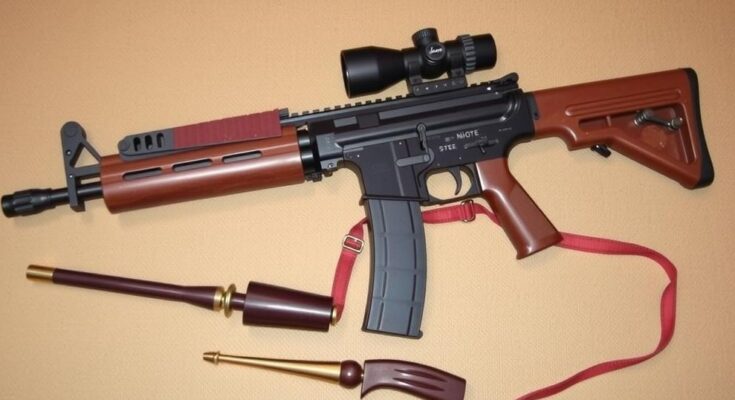Emirati weapons were found in Wad Madani, Sudan, after the Sudanese military’s capture from RSF control. The incident highlights foreign involvement in the conflict, with the UAE accused of supporting the RSF. The ongoing civil war has displaced millions and raised concerns about humanitarian crises and genocide.
Recent reports indicate that large caches of ammunition and missiles with Emirati origins have been discovered in Wad Madani, Sudan, following the Sudanese military’s recapture of the city from the Rapid Support Forces (RSF). Videos circulated online depict soldiers from the Sudanese military exploring the warehouse, affirming that the weapons originate from the United Arab Emirates (UAE). Although inquiries were directed towards the UAE’s embassy in Washington, D.C., no statement had been made regarding the matter at the time of publication.
On Saturday, the Sudanese military, supported by allied factions, announced their control over Wad Madani, which had been under RSF control for a considerable duration during the ongoing civil conflict that erupted in April 2023. RSF leader Mohamed Hamdan Dagalo, more commonly referred to as Hemedti, has accepted defeat in Wad Madani while asserting the ongoing nature of the war. He stated, “We lost Wad Madani, but we will reclaim it. People just need to regroup, reorganise and reassess themselves,” as quoted by Al Jazeera.
The war has resulted in the displacement of over 11 million individuals, with reports indicating that more than eight million are facing imminent famine. Moreover, the U.S. government has recently proclaimed that acts of genocide are occurring in Sudan, implementing sanctions against Dagalo and his family due to widespread atrocities attributed to the RSF.
Both factions are alleged to have profited from the conflict, engaged in the smuggling and sale of critical resources, such as food and medicine. The war’s complexities are compounded by the involvement of foreign nations, particularly the UAE, which has purportedly supported the RSF. Earlier reports from Middle East Eye suggest that Emirati backing has been crucial to the RSF’s sustained fighting capacity.
Furthermore, it was reported that numerous flights from the UAE have landed in Chad, facilitating arms smuggling into Sudan. A UN panel has pointed to credible allegations of the UAE supplying military support to the conflict. The UAE, however, denies these accusations, asserting that they provide humanitarian assistance rather than weapons. It has been noted that many U.S. officials consider the UAE as an enabler of the ongoing war, yet previous administrations have failed to hold Abu Dhabi accountable for its actions.
The ongoing civil conflict in Sudan, which began in April 2023, has resulted in fierce clashes between the Sudanese army and the RSF, leading to significant unrest and humanitarian crises. The RSF, a paramilitary group, has been accused of numerous human rights abuses, contributing to the dire situation that has displaced millions and left many others on the brink of famine. The conflict is reported to be exacerbated by external support, with allegations directed at the UAE for its military backing of the RSF, which has fueled the violence. This military support is perceived to have played a key role in maintaining the RSF’s capacity to engage in prolonged conflicts, despite international calls for resolution and accountability.
In summary, the emergence of Emirati weaponry in Sudan underscores the complexities of the ongoing civil war and the involvement of foreign interests, particularly the UAE’s support for the RSF. The discovery of these arms has raised questions about international accountability and the humanitarian implications of external intervention. With significant civilian displacement and famine looming, the conflict continues to threaten regional stability, demanding urgent attention from global leaders.
Original Source: www.middleeasteye.net




